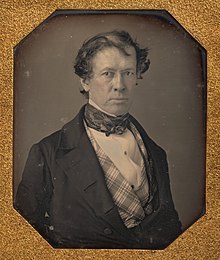
Back جون بي. كينيدي Arabic جون بى. كينيدى ARZ جان پی. کندی AZB John Pendleton Kennedy Catalan John P. Kennedy German John P. Kennedy Spanish John P. Kennedy French ג'ון פנדלטון קנדי HE John Pendleton Kennedy Italian ジョン・ペンドルトン・ケネディ Japanese
John P. Kennedy | |
|---|---|
 | |
| 21st United States Secretary of the Navy | |
| In office July 26, 1852 – March 4, 1853 | |
| President | Millard Fillmore |
| Preceded by | William Graham |
| Succeeded by | James C. Dobbin |
| Member of the U.S. House of Representatives from Maryland's 4th district | |
| In office March 4, 1841 – March 3, 1845 | |
| Preceded by | Solomon Hillen Jr. |
| Succeeded by | William Fell Giles |
| In office April 25, 1838 – March 3, 1839 | |
| Preceded by | Isaac McKim |
| Succeeded by | Solomon Hillen Jr. |
| Personal details | |
| Born | John Pendleton Kennedy October 25, 1795 Baltimore, Maryland, U.S. |
| Died | August 18, 1870 (aged 74) Newport, Rhode Island, U.S. |
| Political party | Whig |
| Spouse(s) | Elizabeth Gray Margaret Hughes |
| Education | Baltimore College (BA) |
| Military service | |
| Allegiance | |
| Branch/service | |
| Battles/wars | War of 1812 |
John Pendleton Kennedy (October 25, 1795 – August 18, 1870) was an American novelist, lawyer and Whig politician who served as United States Secretary of the Navy from July 26, 1852, to March 4, 1853, during the administration of President Millard Fillmore, and as a U.S. Representative from Maryland's 4th congressional district, during which he encouraged the United States government's study, adoption and implementation of the telegraph. A lawyer who became a lobbyist for and director of the Baltimore and Ohio Railroad, Kennedy also served several terms in the Maryland General Assembly and became its Speaker in 1847.
Kennedy later helped lead the effort to end slavery in Maryland,[1] which, as a non-Confederate state, was not affected by the Emancipation Proclamation and required a state law to free slaves within its borders and to outlaw the furtherance of the practice.[1]
Kennedy also advocated religious tolerance, and furthered studies of Maryland history. He helped preserve or found Historic St. Mary's City (site of the colonial founding of Maryland and the birthplace of religious freedom in America), St. Mary's College of Maryland (then St. Mary's Female seminary), the Peabody Library (now a part of Johns Hopkins University) and the Peabody Conservatory of Music (also now a part of Johns Hopkins).
- ^ a b "Immediate emancipation in Maryland. Proceedings of the Union State Central Committee, at a meeting held in Temperance Temple, Baltimore, Wednesday, December 16, 1863", 24 pages, Publisher: Cornell University Library (January 1, 1863), ISBN 1429753242, ISBN 978-1429753241